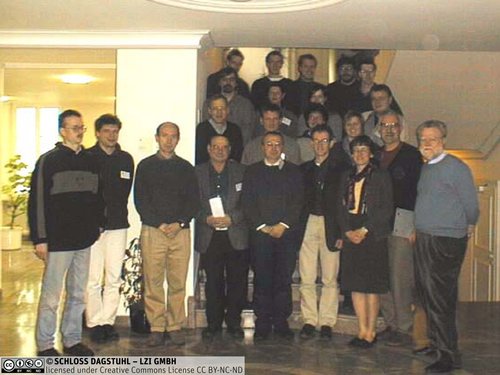Dagstuhl-Seminar 00081
Specification of Distributed Information Systems
( 20. Feb – 25. Feb, 2000 )
Permalink
Organisatoren
- A. Pnueli (Rehovot)
- H.-D. Ehrich (Braunschweig)
- J. Meseguer (SRI, Menlo Park)
- U. Goltz (Braunschweig)
Kontakt
The specification, development and use of distributed information systems is an important research area with many practical applications. Examples for existing such systems are those owned by banks, airlines or governments. Moreover, the explosive growth of the Internet is evidence that a global information structure is developing, and expansion in the use of large distributed information systems can be predicted.
Information systems are reactive systems. Unlike transformational systems---that is, systems whose function is to transform some inputs into output results---reactive systems have an unlimited number of interactions with their environment. Basic notions of program correctness do not apply, and techniques for designing transformational systems do not easily carry over to reactive systems. Non-distributed reactive systems, like conventional operating and database systems, are not easy to design, implement and restructure, a lot remains to be done to develop helpful high-level concepts, features, languages, methods and tools. However, existing products can already cope successfully with reasonably complex systems in practice. Formal methods from logic, algebra and process theory have been successfully applied, for instance in query and transaction processing, but they are not in general standard engineering practice yet.
Distributed reactive systems are still an order of magnitude more complex and difficult to specify, analyse, implement and reconfigure. They are not well understood, and methods for designing, implementing and reengineering them have not yet reached a level of mature and sound engineering practice.
A great challenge is to cope with concurrency, synchronization, and communication at an appropriate level of abstraction. Process theory provides useful theoretical concepts for concurrency and interaction. But those providing high-level declarative specification concepts, like temporal logic, tend to be sequential in nature, while those capable of expressing full concurrency, like Petri nets, tend to be operational: the level of abstraction is low. A possible approach is to adopt concepts from process algebras which provide compositional system descriptions and formalize dynamic behavior. However, many conceptional and theoretical questions then arise. On the other hand, the developed concepts need to be investigated and evaluated in the light of concrete applications. Both these aspects will be the central concern of this seminar.
In particular, we would like the following topics to be addressed
- Modelling and design methods.
Information systems involve data, objects and global processes. Inconceptual modeling, these aspects have been addressed in isolation and various combinations, and the same holds for the conceptual modeling perspectives: system architecture, object classes, object behavior, and object communication. Diagrammatic modeling approaches like Ooa&d, Omt, Oose and their recent amalgamation Uml employ a multitude of specification concepts and techniques that are not always well integrated and sometimes not well understood. Approaches for giving formal semantics for (subsets of) Uml would give a more clear picture of the underlying system model.
- Semantics of object-oriented specification languages.
Describing the semantics of a formal language amounts to giving a map from syntactic constructs into a suitable semantic domain. For object-oriented specification languages, possible domains are process algebras, Petri nets, event structures, the actor model, type algebra, and others. Studies on relating and evaluating such domains are necessary. Interesting language issues are (amongst others) module composition, refinement and atomicity.
- Logics for distributed systems.
An attractive model for the execution of a distributed system is a distributed process, which has a time line for each location of the system. Temporal logics based on this notion are particularly suited for the specification of distributed systems. Rewriting logic is another well known and quite successful paradigm in this field. There is a multi-purpose specification language, Maude, that is based on rewriting techniques.
- Mobility.
For modeling large systems of communicating objects, it is indispensible to deal with a dynamically changing communication structure. In processalgebras, this issue has been formally dealt with in the -calculus and, more recently, in the fusion calculus.
- Application-oriented concepts in specification languages.
Among the issues to be addressed are real time, fault tolerance, and internet applications. In particular, we intend to discuss specific applications in the context of the special program Integration of software specification techniques for engineering applications of the German national science foundation (DFG).
This seminar is planned as the follow-up of the Dagstuhl Seminar 98071 "Information Systems as Reactive systems", which took place in February 1998. Until that seminar, there was little interaction between the communities concerned with information systems and concurrency theory. One outcome of the seminar was that there is a definite need for interaction; new contacts have been established. The focus of the present seminar is again to bring experts from the respective fields together. In contrast to the previous seminar, we will however put even more focus on applications, seeing the design of distributed information systems not only as theoretically challenging but also as an engineering problem.
- A. Pnueli (Rehovot)
- H.-D. Ehrich (Braunschweig)
- J. Meseguer (SRI, Menlo Park)
- U. Goltz (Braunschweig)
Verwandte Seminare
- Dagstuhl-Seminar 98071: Information Systems as Reactive Systems (1998-02-16 - 1998-02-20) (Details)


